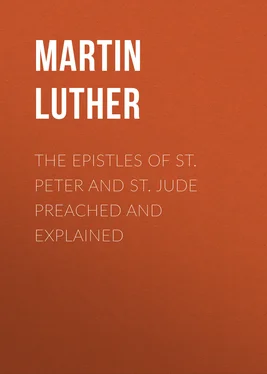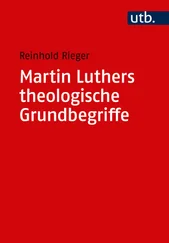Martin Luther - The Epistles of St. Peter and St. Jude Preached and Explained
Здесь есть возможность читать онлайн «Martin Luther - The Epistles of St. Peter and St. Jude Preached and Explained» — ознакомительный отрывок электронной книги совершенно бесплатно, а после прочтения отрывка купить полную версию. В некоторых случаях можно слушать аудио, скачать через торрент в формате fb2 и присутствует краткое содержание. Жанр: foreign_prose, foreign_religion, Философия, foreign_psychology, foreign_antique, на немецком языке. Описание произведения, (предисловие) а так же отзывы посетителей доступны на портале библиотеки ЛибКат.
- Название:The Epistles of St. Peter and St. Jude Preached and Explained
- Автор:
- Жанр:
- Год:неизвестен
- ISBN:нет данных
- Рейтинг книги:5 / 5. Голосов: 1
-
Избранное:Добавить в избранное
- Отзывы:
-
Ваша оценка:
- 100
- 1
- 2
- 3
- 4
- 5
The Epistles of St. Peter and St. Jude Preached and Explained: краткое содержание, описание и аннотация
Предлагаем к чтению аннотацию, описание, краткое содержание или предисловие (зависит от того, что написал сам автор книги «The Epistles of St. Peter and St. Jude Preached and Explained»). Если вы не нашли необходимую информацию о книге — напишите в комментариях, мы постараемся отыскать её.
The Epistles of St. Peter and St. Jude Preached and Explained — читать онлайн ознакомительный отрывок
Ниже представлен текст книги, разбитый по страницам. Система сохранения места последней прочитанной страницы, позволяет с удобством читать онлайн бесплатно книгу «The Epistles of St. Peter and St. Jude Preached and Explained», без необходимости каждый раз заново искать на чём Вы остановились. Поставьте закладку, и сможете в любой момент перейти на страницу, на которой закончили чтение.
Интервал:
Закладка:
Be sober. To be sober is of service outwardly to the body, and is the chief work of faith. For though a man has been justified, he still is not secured from evil lusts; faith has indeed begun to subdue the flesh, but this is ever bestirring itself, and likewise running riot in all sorts of lusts, which would gladly break forth again and act after their own will. Therefore the spirit must daily work to restrain and subdue it, and must charge itself therewith, without intermission, and have a care of the flesh that it do not destroy faith. Therefore those persons deceive themselves, who indeed say they have faith, and imagining that this is enough, live thenceforth according to their own caprice. Where the faith is genuine it must control the body and hold it in check, so that it shall not do what it lusts after. Therefore St. Peter says that we should be sober.
Yet he would not have us destroy the body or weaken it too much, as we find many do who have fasted and tortured themselves to death. St. Bernard, even, continued for a long time in this folly, although he was truly a holy man, for he mortified his body to such an extent that his breath was offensive and could not be endured. Yet he afterwards forsook it, and charged his brethren that they should not inflict injury upon the body; for he saw very well that he had rendered himself unfit to be of service to his brethren. Therefore St. Peter requires nothing more than that we should be sober,—that is, mortify the body to such an extent as to prevent its being in our apprehension too wanton; for he fixes no definite time how long we should fast, as the Pope has done, but leaves it to each, individually, to fast so that he remain sober and do not burden the body with gluttony, to the end that he remain in possession of reason and reflection, and consider how far it is necessary for him to hold the body in check. For it is utterly idle to impose one and the same command upon a whole congregation and church, since we are so unlike one to the other; one strong, another weak in body,—so that one must mortify it more, another less, provided the body is to remain sound and in the best state for exertion.
But another multitude mistake here, determined that they will not fast, and that they may eat flesh, and herein are wrong. For these persons reject the Gospel also, and are unprofitable as well as the others; doing no more than contemn the Pope's command, unwilling to gird up their mind and spirit, as Peter says, leaving the body to its own caprice, that it may become corrupt and wanton. It is well to fast; but that only can be called true fasting, when we give the body no more food than is needful for it that it may retain its health and endure labor and watchfulness—that the old ass do not become too obstinate, and going on the ice to dance, break a bone; but go on subject to control, and following the spirit; not after the manner of those who, whenever they fast, fill themselves so full of fish and the best wine, that their bellies are puffed out. Thus St. Peter directs us to be sober, and now says further:
And fix your hope firmly (or with all deliberation) on the grace which is offered you. The christian faith is of such a nature that it plants itself freely on the word of God with entire confidence, ventures freely thereupon, and goes joyfully onward. Therefore Peter would say: The loins of your mind are girt about, and your faith is genuine, when you venture it thus on that Word, let it cost what it will,—property, honor, limb, or life.
Thus has he with these words in truth well described a genuine and unfeigned faith. It must not be a corrupt and sleepy faith, becoming thus only a dream, but a living and active reality, that we may with all deliberation devote ourselves to it and cleave to the Word, so that, let God permit it to go with us as it will, we will yet press onward through good and ill. Thus when I come to die I must venture promptly on Christ, lift my head boldly, and rely upon the word of God which cannot deceive me. Thus must faith go straight forward, in nothing permit itself to be led astray, and subject to scrutiny all that it sees, hears and feels. Such faith St. Peter requires as consists, not in thought or word, but in such power as this.
Again, St. Peter says: Set your hope on the grace which is offered you. That is, ye have not deserved this great grace, but yet it is freely offered you; for the Gospel, which reveals this grace, is no invention or discovery of our own, but the Holy Spirit has sent it down from heaven into the world. But what is it that is offered to us? This, that we have already heard, that whosoever believes on Christ and cleaves to the Word possesses Him , with all the blessings He has to give, so that He is Lord over sin, death, the devil and hell, and is assured of eternal life. This treasure is brought to our doors and laid in our bosom without our help or desert, yes, beyond our expectation and without our knowledge or thought. Therefore the Apostle would have us venture thereon cheerfully, for God, who offers us such grace, will surely not deceive us.
Through the revelation of Jesus Christ. God permits none to make the offer of His grace except through Christ. Therefore no man should attempt to approach Him apart from this Mediator, as we have already above heard sufficiently. For He will hear no one but him who brings His dear Son with him, whom He alone regards, and for His sake those that depend upon Him. Therefore He would have us confess the Son, that we are reconciled through His blood to the Father, so that we may approach before Him. For to this end did Christ come into the world, assume flesh and blood, and joined Himself to us, that He might obtain such grace for us with the Father. So, too, all the prophets and patriarchs have been kept and saved, through such faith on Christ. For they all have exercised faith in the promise which God made to Abraham, "Through thy seed shall all nations be blest." Therefore, as we have said, to the Jews and to the Turks, faith is of no avail, neither to any that rest upon their own works and would thereby reach heaven. So Peter says, this grace is offered you, but it is through the revelation of Jesus Christ (or to render it more clearly into our language), because that Jesus Christ has been revealed to you.
Through the Gospel it is made known to us what Christ is, that we may learn of Him, moreover, that He is our Saviour. He rescues us from sin and death, and helps us out of every evil, reconciles us to the Father, and, apart from our own works, justifies and saves us. Whoever then does not thus confess Christ must be lost; for although you may know that He is the Son of God, that He died and has risen, and sits at the right hand of the Father,—still you have not yet truly known Christ, it is all of no avail to you; but you must know and believe that He has done it all for your sake, if your faith is to help you. Therefore that is a vain, senseless doctrine that has been hitherto preached and taught in the great schools, which have had no experience of this knowledge, and have only attained to imagine how the curse afflicted Christ our Lord, and how He sits above in heaven unemployed, and possesses a joy with Himself; and thus their hearts remain barren, so that faith cannot live in them. But Christ does not stand there for Himself, but He is to be preached that He is ours. For what necessity could there then have been that He should have come down to earth and have shed His blood? But since He has been sent into the world, as He says, John iii., "that the world through Him might be saved." He certainly must have fulfilled this mission, because He was sent from the Father. For this sending forth and proceeding from the Father is to be understood not only of the divine nature, but also of the human nature and of His ministry. As soon as He was baptized this began, and He has fulfilled it, for which end He was sent and came into the world, to wit, that He might preach the truth and obtain it for us, that all who believe on Him shall be saved. Thus has He revealed Himself, and presented Himself to our knowledge, and offered us grace.
Читать дальшеИнтервал:
Закладка:
Похожие книги на «The Epistles of St. Peter and St. Jude Preached and Explained»
Представляем Вашему вниманию похожие книги на «The Epistles of St. Peter and St. Jude Preached and Explained» списком для выбора. Мы отобрали схожую по названию и смыслу литературу в надежде предоставить читателям больше вариантов отыскать новые, интересные, ещё непрочитанные произведения.
Обсуждение, отзывы о книге «The Epistles of St. Peter and St. Jude Preached and Explained» и просто собственные мнения читателей. Оставьте ваши комментарии, напишите, что Вы думаете о произведении, его смысле или главных героях. Укажите что конкретно понравилось, а что нет, и почему Вы так считаете.












